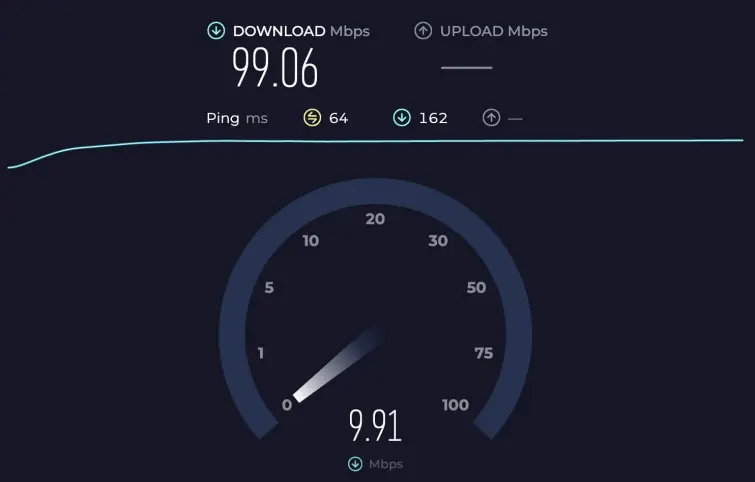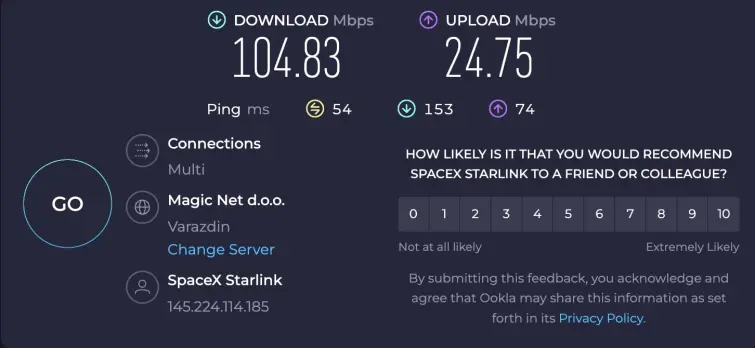A VPN speed test is the best way to tell if your sudden speed drops are the result of a VPN connection, unstable network, or something else. It may sound like a high-tech task, but this can be done in only a few minutes. We'll guide you through the procedure, step-by-step.
It's true that a VPN can affect your internet speed, due to its encryption and data traffic re-routing processes, however, the change shouldn't be noticeable – especially if you opt for a reputable VPN provider. Still, whenever there's a lag or buffering with a demanding online task (streaming, torrenting), we tend to instantly blame the VPN for it.
Sometimes this is fair, but often there's something else interfering with your connection. Whether it’s outdated hardware, too many connected devices, ISP throttling, malware infections, or an inherently slow network, there are simply many things that could have gone wrong.
Despite this, we do agree that you should always check whether the VPN is the problem. Keep scrolling to learn how.
But before we dig into it, is your VPN even on?
It’s happened to me numerous times where I blame a VPN for a poor connection, only to realize that I wasn't even connected. We are all human after all, and this is a fast-paced world. 🤷🏻♀️

How to test a VPN speed?
Now that you've established you're connected to a VPN, let's see if that's really what's slowing you down.
To run a quick but reliable VPN speed test, simply follow these steps:
- Disconnect from the VPN to be able to check your regular internet speed results.
- Open your web browser and visit a speed test website like Speedtest.net. Or even better, download a reliable speed testing app, such as the speed testing app by Ookla.
- Run the test and write down the results, both download and upload speeds.
- Connect to the VPN. Open your VPN application and connect to a server. Once connected, return to the speed test website.
- Run the speed test again – this time while connected to the VPN. Compare the results with the initial test to see the impact of the VPN on your internet speed.
If you have time, repeat the procedure at least a couple of times for better average results and to be sure there wasn't a mistake. By comparing these two sets of results, you can determine how much your VPN affects your internet speed, and whether it is necessary to assess/improve its performance – or change your VPN altogether.
What is a fast VPN?
You compared the results, but what now? How do you determine what makes a VPN fast?
A fast VPN is a VPN that doesn't change your internet speed significantly. The most important factors for a fast VPN include speedy VPN servers and plenty of them to avoid congestion. On top of that, renowned VPN providers offer advanced performance features (quick connect, split tunneling, etc.) and VPN protocols that can truly make a difference.
For example, ExpressVPN offers a variety of VPN protocols, of which Lightway is the fastest. So, by choosing this VPN protocol, you can get significantly ahead with your VPN speeds, especially compared to other services that offer dated or sluggish VPN protocols.
ExpressVPN and other VPNs we usually recommend for speed are designed to be so fast that any decrease in your internet speed will be almost imperceptible. These VPNs offer server networks with speeds far exceeding typical home internet connections, ensuring a smooth and efficient browsing experience.
However, it's important to note that a VPN cannot exceed the internet speed provided by your Internet Service Provider (ISP). For instance, if you have a decent 100 Mbps download and 10 Mbps upload speed, these won't increase simply because the VPN servers are fast. Instead, you can expect your internet speed with the VPN to be nearly identical to your regular connection speed. In other words, a fast VPN should provide you with the same performance level while ensuring you benefit from enhanced security and privacy.

What can cause a VPN to slow down?
Experiencing slow VPN speeds is not only frustrating but can also be counterproductive, and even dangerous (if the problem lies in the VPN software or feature). However, VPN slow-downs happen even with renowned services. The important thing is to learn how to recognize the cause of the problem and optimize your VPN connection accordingly.
- Server distance – Connecting to a VPN server that's far from your geographical location can increase latency and reduce speed because data needs to travel further. Sometimes connecting to a server far away is inevitable, for example, when you need to access country-specific content, but in any other situation, choose a server that's nearby.
- Server load – When too many people connect to the same VPN server at the same time. This can cause congestion, leading to slower speeds.
- Encryption – Encrypting and decrypting data can also slightly reduce speeds, especially with outdated VPN software that contains too many lines of code.
- Internet connection speed: Your regular internet speed sets the maximum limit for your VPN speed. If your connection is usually slow, your VPN connection will be slow as well. However, if your ISP slows down only some of your online activities on purpose (known as ISP throttling), this can be offset by a VPN. Since a VPN hides your online traffic, your ISP can't see what you do online, and, therefore, it can't throttle your speeds.
- VPN protocols – Some VPN protocols are slower than others. For instance, OpenVPN is considered slower than cutting-edge protocols like WireGuard and NordLynx. OpenVPN, however, is usually faster than IKEv2 and L2TP VPN protocols.
- Hardware limitations – Devices with less processing power and older devices may struggle to handle the additional work required by a VPN, resulting in slower speeds.
- Network congestion: General internet congestion, such as peak usage times, can also affect your VPN speed.
Can I increase my VPN speeds, and how?
Now that you're familiar with the potential causes of unsatisfactory VPN speeds, you are one step closer to optimizing your VPN performance. Here's what you should try.
- Connecting to a server nearby – Selecting a server that's physically closer to you should be the first thing you try to reduce latency and improve speeds. It only takes a moment of your time anyway, so there's nothing to lose.
- Select a less crowded server location – Many VPN apps display server loads. If a server location doesn't make a difference to you, opt for one that's less popular and, therefore, less crowded. This way, you can avoid congestion and enjoy faster speeds.
- Switch to a faster VPN protocol: Switching to a faster protocol, such as WireGuard or Lightway, can noticeably enhance your VPN performance compared to older protocols like OpenVPN or IKEv2.
- Update your VPN app – Ensure you are using the latest version of your VPN. Updates are important because they come with performance improvements and bug fixes.
- Restart your device – Sometimes, restarting your device or Wi-Fi router can resolve network issues and improve speed. As simple as it sounds, it might be the solution that you seek.
- Use a wired connection – If speed is of an absolute priority to you, connect your device to your router via an Ethernet cable for the most stable and fastest internet connection.
- Disable unnecessary features – Turn off VPN features like double encryption and other security layers if you don't need them, as they make your VPN somewhat slower.
- Enable speed-friendly features – Likewise, you should make use of features that can improve your VPN speeds, like split tunneling that separates your VPN and non-VPN traffic, so not all of your data gets encrypted and re-routed.
- Upgrade your internet plan – If your Wi-FI or mobile internet is already slow, it might be an obstacle to your VPN performance. Consider upgrading your internet plan to a faster one, as this directly affects your VPN speed.
If you have tried everything but your VPN is still slower than it should be, maybe it's time to change your service provider altogether. People complaining about that same VPN (on forums or review sites) and no visible improvements in the service over the years are also the red signals you shouldn't ignore.
What is the fastest free VPN?
Determining the fastest quality free VPN can be challenging, as free VPNs typically come with limitations that impact both performance and security. However, among the secure free VPN options, ProtonVPN and Hide.me are known for their decent speeds – they’re still not great though.
We usually do not recommend using free VPNs, as they come with bandwidth limitations, fewer server options, and slower speeds compared to their paid plans or other competitors.
What's more, some of the unverified free services could even compromise your privacy by logging your data, displaying intrusive ads, or spreading malware, making them downright dangerous. Investing in a reputable paid VPN service is always a better option, and it doesn't have to cost you a fortune.
VPN speed test FAQs
Here are some of the most Frequently Asked Questions (FAQs) regarding VPN speeds.
